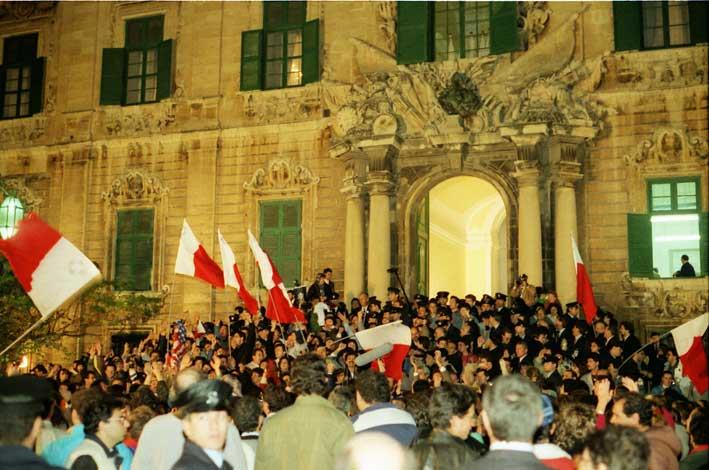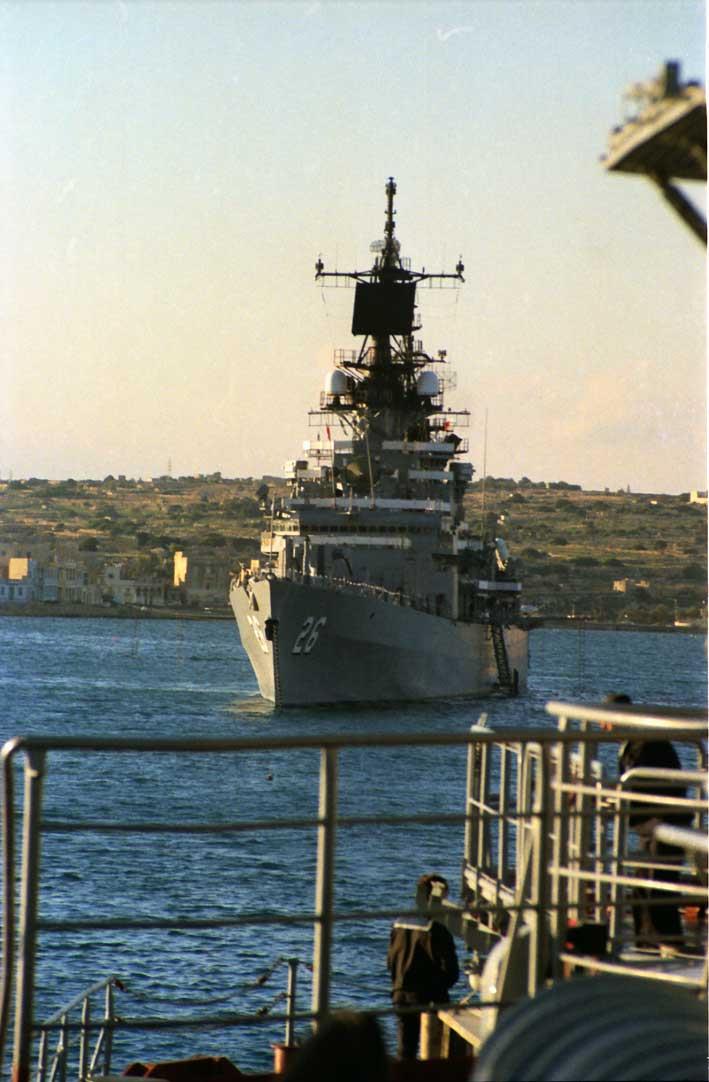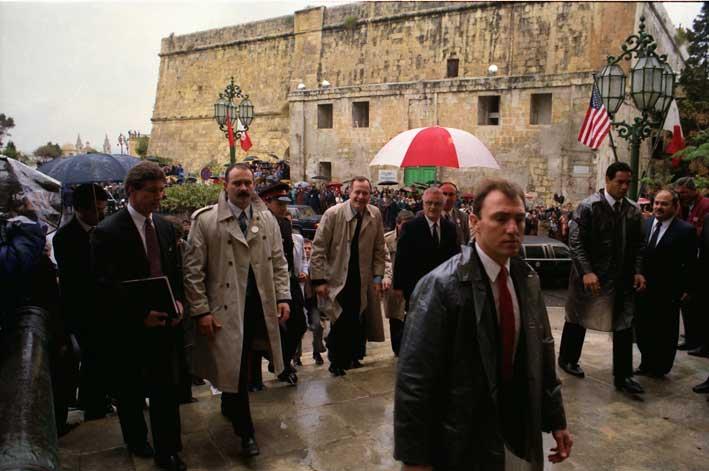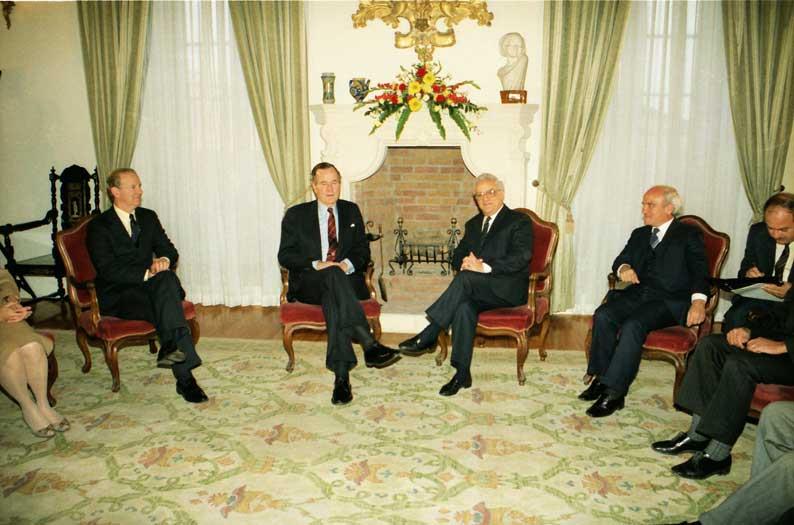The weekend of 1-3 December 1989 will be remembered as the days in which the Cold War was forever thawed in the choppy seas of Marsaxlokk Bay as the then leaders of the United States and the Soviet Union - George Bush and Mikhail Gorbachev - met in Malta to literally draw a line under their previous differences and set sail towards a new era of world history.

The summit, held just a month after the Berlin Wall was famously dismantled brick by brick by a jubilant mob, marked the end of post World War II hostilities between the world's superpowers. As a Soviet official had remarked at the time, the summit had "buried the Cold War at the bottom of the Mediterranean" - where it rests to this day, presumably on the seabed somewhere between Marsaxlokk and Birzebbuga.

That weekend, Malta was the centre of the world's attention when the leaders of the two world superpowers met on board the Soviet cruiser SS Maxim Gorky, anchored in Marsaxlokk Bay.
History had turned full circle on that incredibly stormy weekend. On 2 February 1945, US President Franklin D. Roosevelt and British Prime Minister Winston Churchill had met in Malta before their meeting in Yalta with Soviet leader Joseph Stalin. That meeting meant the end of World War II, but it was also the start of a new period of instability that culminated in what became known as the Cold War.

The political divide between East and West, physically established with the building of the now demolished Berlin Wall, kept the world on tenterhooks for decades, as the Americans and Soviets became entangled in a war of words that went beyond politics.
The thaw in the relationship between the two superpowers began when Mikhail Gorbachev, with his "glasnost" and "perestroika" (openness and restructuring) policies, became Soviet Union President. Growing unrest in some of the countries behind the Iron Curtain culminated in the bringing down of the Berlin Wall on 9 November 1989.

Eddie Fenech Adami, then Malta's Prime Minister, had been the first head of government to cross over from West Germany into East Germany soon after the Berlin Wall came down. And he was also the head of government of the country that hosted the Bush-Gorbachev meeting that signalled the end of the Cold War.
The leaders discussed the many changes taking place across Eastern Europe, Gorbachev's perestroika plans and the lifting of the Iron Curtain, which had bitterly separated Eastern and Western Europe for the four decades following World War II.

Speaking at a joint news conference at the Mediterranean Conference Centre, the Soviet leader announced: "The world is leaving one epoch and entering another. We are at the beginning of a long road to a lasting, peaceful era. The threat of force, mistrust, psychological and ideological struggle should all be things of the past. I assured the President of the United States that I will never start a hot war against the USA."
In reply, President Bush said: "We can realise a lasting peace and transform the East-West relationship to one of enduring co-operation. That is the future that Chairman Gorbachev and I began right here in Malta."

Conversation between USSR President Mikhail Gorbachev and US President George H.W. Bush in their first one-on-one meeting in Malta on 2 December 1989
Gorbachev:
First, I would like to say that the direction of changes in Eastern Europe and the Soviet Union moves us closer and that it is the main thing. However, there is also something else which is important. I can't accept some American politicians saying that the moves to prevent a split in Europe should be based on Western values. It looks as though if in the past we were accused of 'exporting the revolution'; today it is about the export of American values. I think this does not comply with the spirit of current changes and could complicate ongoing processes. I wanted to tell you this although I know that your position is different.
In this connection, [I would like to move on to] the 'German question'. Our impression is that Mr Kohl is hurrying, fussing, acting irresponsibly, and not approaching things seriously. Wouldn't it just be possible that the theme of re-unification be exploited for electioneering, that momentum would become more important than strategic factors? Talking of which, there is a difference in opinion on this question in the Federal Republic of Germany [FRG], both within the governing coalition and Social Democrats. However, we must make it clear to everyone that certain actions can harm positive processes and, moreover, put in question very important and serious issues, including trust in the FRG government.
So what will it be? Will united Germany be a neutral country, not belonging to any [international] military or political group, or will it be a member of NATO? I think we should make it clear that it is too early to discuss either option now. Let the process take its course, let's not push it.
It is not us who are responsible for the division of Germany, that was up to history. Let history decide this issue in the future too. I think we understand each other on this.
Bush:
I think that Helmut Kohl is largely driven by emotions in reaction to the developments. The same could be said about [Hans-Dietrich] Genscher. Yes, in the three-point programme one can sense some influence of electioneering. However, this wave of emotion must be considered.
Kohl knows that some Western allies, while publicly supporting re-unification given that is the will of the German people, are actually concerned about it.
Gorbachev:
Yes, I know this. And this point of view has been relayed to him. However, unlike you or your allies, I tell you straight: two German states appeared in the course of history. Let history decide this process and its results in the context of the new Europe and new world. Kohl said many times that he understands his responsibility and that he will comply with the understanding we both reached in Bonn. This is a case where we have to act with the utmost care so as to avoid any blow to those changes that have recently started.
Bush:
I agree. We will not do anything rash in order to speed up the question of re-unification.
If you speak to Kohl, you will see that he agrees with my approach and if some of his public statements do not always confirm this, that is due to the peculiarities of his political system, as well as the emotional side. Particularly the latter. They speak about this topic with tears in their eyes.
Gorbachev:
I would like to stress that the changes leading to normalisation of contacts, higher cooperation and better trade links between two German states are seen by us as positive.
Bush:
As strange as it would seem, on this question you are in the same boat with our NATO allies. The most conservative of them welcome your approach. At the same time, they have to think about that time when such concepts as the FRG and the GDR will become part of the past. In this question, I will be acting with great care. Let our Democrats accuse me of being timid but I am not going to jump on the wall because there is too much at stake here.
Gorbachev:
Yes, a president should not be jumping on the wall. (Laugh)
(?)
Bush:
I would like to clarify one point. You expressed your concern regarding Western values. This would have been understandable if our commitment to certain ideals led to difficulties in the USSR or Eastern Europe, stood in the way of their progress. However, we have never pursued such objectives. Every discussion of Western values at NATO or other Western organisations is absolutely natural and not destructive. After all, what are Western values? They are transparency, pluralism, openness, free debate. In economic terms, it is the engine room of progress, free market. These values are not something new or opportunistic, they have been shared for a long time by us and people in Western Europe, they unite the Western world. We welcome changes in the Soviet Union or Poland and do not set them against Western values. Therefore I would like to see your point of view as well as possible, so as to avoid any misunderstanding.
Gorbachev:
The main principle which we have adopted and which we follow as part of our new thinking is the right of each country to choose, including the right to reconsider and change its original course. This is a very painful process; however this is a fundamental right: the right to choose without interference from outside. The USA is committed to a particular social and economic system chosen by the American people. Let people of other countries also decide which, let's say, god they want to pray to.
It is important for me that the new tendency for a renewal in Eastern and Western Europe moves towards closer convergence. The result will not be a copy of the Swedish, British or Soviet model. No. What will come out will be something that meets the requirements of the current stage in the development of human and European civilisation.
We know that people are not now afraid when faced with a choice of either one of the systems. They are looking for their own version, which will provide them with a better life. When this search is free, we can only say: good for you.
Bush:
I don't think that we differ here. We welcome self-determination [of states] and debates that accompany it. I would like to see our approach in a positive light: Western values do not mean forcing our system on to Romania, Czechoslovakia or even the GDR.